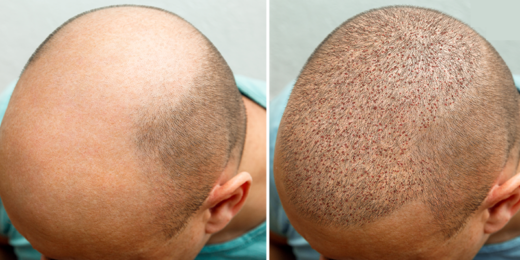Undergoing a hair transplant is a significant step towards regaining confidence and achieving a fuller head of hair. However, like any medical procedure, it comes with potential side effects. This guide explores the most common post-transplant reactions and how to effectively manage them.
Common Side Effects After a Hair Transplant

1. Pain and Discomfort
Understanding Post-Surgical Pain
Following your hair transplant, you may experience discomfort, particularly within the first 24 hours. This sensation can be described as a mild burning or soreness in both the donor and recipient areas. The discomfort is usually most intense on the first night and gradually subsides over the following days. In extensive procedures, some individuals may experience mild pain for up to two weeks.
Pain Management Solutions
To ease discomfort, over-the-counter medications such as Ibuprofen and Paracetamol are typically sufficient. If pain persists beyond a reasonable timeframe, consulting your surgeon is essential to rule out complications related to the healing process.
When Should You Be Concerned?
If pain lingers longer than expected, it may indicate an underlying issue such as improper healing or excessive extraction of donor follicles. In such cases, a follow-up consultation with your surgeon is recommended.
2. Swelling and Inflammation
Why Does Swelling Occur?
Swelling, medically known as oedema, is a natural response to the surgical trauma endured by the scalp. It typically affects the forehead and, in some cases, may extend down to the eyelids, causing temporary puffiness.
How to Reduce Swelling?
To minimize swelling, Erdem Hospital provides anti-inflammatory medications such as dexamethasone, which significantly reduces post-operative inflammation. Most patients experience little to no swelling when properly medicated.
Persistent Swelling: What to Do?
In rare cases, swelling may persist beyond the first week. If it spreads excessively or affects vision, contacting your hair transplant specialist for further advice is recommended.
3. Bleeding and Scab Formation
Expected Bleeding After Surgery
Minimal bleeding is common immediately after the procedure, especially in the donor area where grafts have been extracted. This typically stops within a few hours and is followed by the formation of tiny scabs, which play a crucial role in the healing process.
What If Bleeding Continues?
If you notice continued bleeding the day after surgery, gently apply pressure using a clean cotton pad. Avoid rubbing, as this may disturb newly implanted follicles. If excessive bleeding persists despite applying pressure, seek medical attention from your surgeon.
4. Itching: A Natural Part of Healing
Why Does Itching Occur?
Itching is a common side effect during the recovery period. It often develops 4-5 days post-surgery and can last for several weeks. This sensation is typically due to the scalp healing and, in some cases, dryness caused by the procedure.
Ways to Manage Itching
To relieve itching, consider the following solutions:
- Avoid scratching: Scratching can dislodge fragile grafts.
- Use saline spray: Helps to keep the scalp hydrated.
- Take an antihistamine: Can reduce the sensation of itchiness.
- Apply a medicated shampoo: Helps soothe irritation.
- Use a mild steroid solution: This may be prescribed for persistent cases.
5. Scab and Crust Formation
Why Do Crusts Appear?
Small crusts form around the newly implanted grafts due to dried blood and plasma. This is completely normal and is part of the natural healing process.
Proper Care for Crusting
- Avoid picking or scratching the scabs.
- Regularly mist the scalp with a saline solution for the first few days.
- After five days, begin gently washing the scalp, allowing water to trickle over the head instead of applying direct pressure.
- By the second week, the majority of crusts should have naturally fallen off.
6. Temporary Hair Shedding (Shock Loss)
Understanding Shock Loss
Some individuals experience temporary hair shedding, known as “shock loss,” in the weeks following the transplant. This occurs because the newly implanted follicles enter a dormant phase before beginning the normal growth cycle.
When Will Hair Regrow?
Shock loss is temporary, and new hair typically starts growing within 8-12 months. This phase is an expected part of the recovery process, and there is no cause for alarm.
7. Risk of Infection
How Infections Occur
Although rare, infections can occur if bacteria enter the tiny incisions made during the procedure. Symptoms include redness, tenderness, and the presence of small, yellowish pustules in the grafted area.
Treatment for Infection
- Antibiotic medication: Usually prescribed in pill or cream form.
- Proper scalp hygiene: Prevents bacterial growth and promotes healing.
- Immediate consultation: If you notice signs of infection, contact your surgeon promptly.
Why Choose Erdem Hospital for Your Hair Transplant?

At Erdem Hospital, we take pride in offering world-class hair transplant services backed by cutting-edge technology and experienced specialists. Our clinic is recognized for its exceptional hair transplantation and aftercare services, ensuring each patient achieves the best possible results.
What Sets Us Apart?
✔ Expert Surgeons: Our team consists of highly skilled professionals with years of experience in hair restoration.
✔ Personalized Treatment Plans: Every procedure is tailored to the individual needs of our patients.
✔ Comprehensive Aftercare: From post-operative medications to follow-up appointments, we ensure a smooth and successful recovery.
✔ Advanced Techniques: We use the latest hair transplant methods, including FUE (Follicular Unit Extraction) and DHI (Direct Hair Implantation), to deliver natural-looking results with minimal downtime.
✔ State-of-the-Art Facilities: Our hospital follows the highest medical standards, ensuring a sterile and safe environment for every procedure.
At Erdem Hospital, we are dedicated to restoring not just hair, but confidence. Book a consultation with us today and experience the best hair transplant services available.